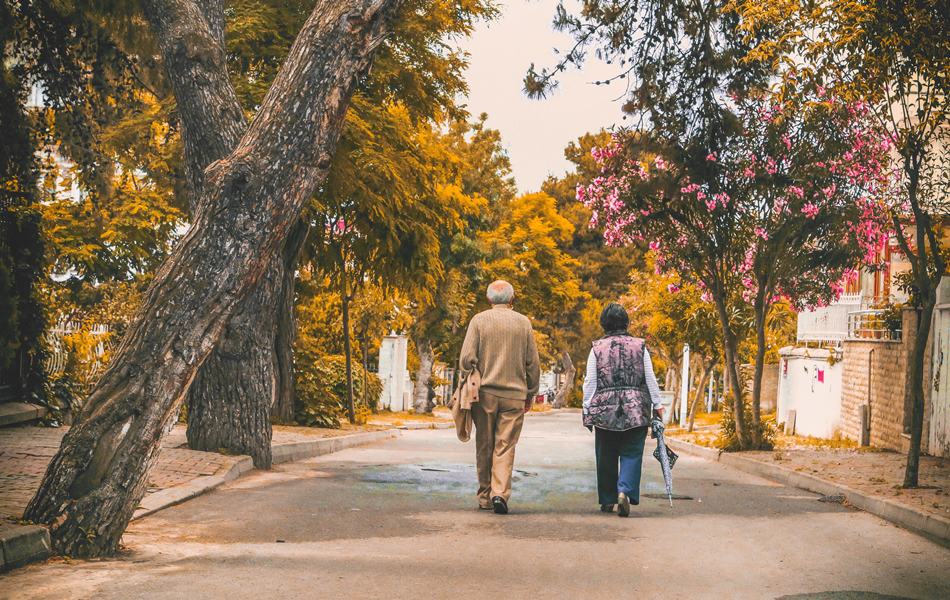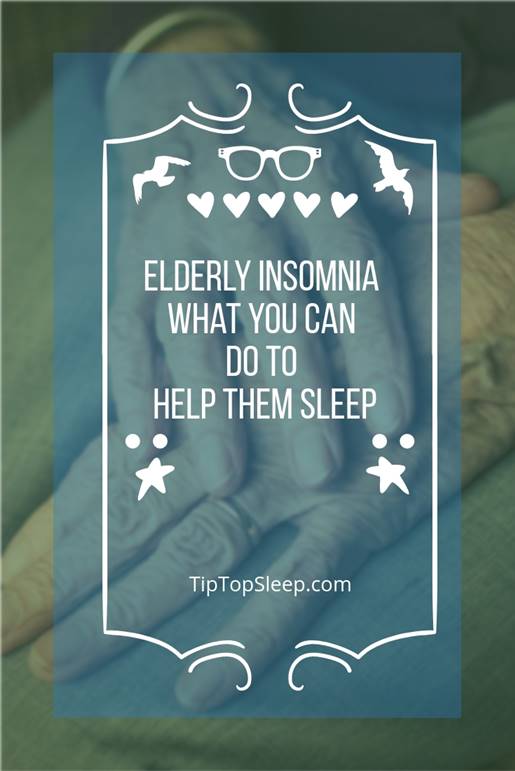It makes sense that we will require different amounts of sleep throughout a lifetime. When we are younger, fitter, and healthier we can get away with less sleep.
Sometimes we have no choice such as when starting a family and having the responsibility of young children. As well as fitting in work and the other day to day activities sleep is sometimes last on the list of priorities.
Elderly Insomnia in older adults is very common. But for me, it hardly seems fair that after a full life elderly adults may then start to experience sleep difficulties.
What can you do as someone who is there to assist an elderly person try to get some more sleep? Well below I’ve given you the quick answer, then a short explanation as to why sleep deprivation can occur.
Followed by some ideas to get a better sleeping plan together. Finally, some excellent tips to help elderly sleep and more.
Elderly Insomnia can exist for no particular reason. If you can help your loved one to identify what could be causing their insomnia you can then assist them in implementing some strategies to get more sleep. This, in turn, will help with their overall health and well being.
As a carer, family member or concerned friend sit down with the elderly person and make a plan or daily routine together. A great start would be to implement some of the ideas set out below.
What Causes Insomnia in the Elderly?
Extensive studies have been conducted and there is no definitive answer. As we are all so different and there are so many variables to consider.
Those elderly who are in reasonable health and are the more active report that they get reasonable amounts of sleep.
Then there are the elderly with more health issues and it is reported that they experience less sleep. And the sleep they do get is often interrupted.
These poor sleep patterns, in those with existing health issues, can then contribute to further health issues such as depression.
How Many Hours of Sleep Do the Elderly Need?
7 to 8 hours of sleep is the gauge. Normally there will be up to 4 hours of deep REM sleep followed by lighter sleep until waking.
Medical Intervention
Sleep deprivation is to be taken very seriously so if lack of sleep keeps up for more than a couple of days your loved one should seek medical attention as soon as possible. After there is an all-clear scenario trying some of the ideas below could be the next step.
Best Treatment for Insomnia in Older Adults
Strategies for Getting More Sleep
Working together to achieve a specific outcome could very well be the key. So sit down and ask questions and make a plan together.
- Really dig deep with your questions and listen to how they get through their days and nights. The good and the bad.
- These questions could well reveal what the actual problem is and with a little assistance could be totally fixable.
- There may not be some big sleeping issues going on with them but a lot of little things they need assistance with.
- Also, find out their likes and dislikes. Maybe they are not doing enough of the things that make them happy and content. Or maybe they are doing things that they don’t really like.
- Find out if there is anything worrying them you will then be able to strategize and try to relieve some of this worry.
- Independence is another big issue in the mind of the elderly! After all who wants to be in an aged care facility?
- Stress, the elderly have a lot of time to worry and reflect, this may not seem like something that could cause sleep disruption to us. But in my experience, they worry about the smallest things.
- We carers need to remember that the elderly have a lot more “time” in their 24 hour day than us who are younger and busier. One of the biggest worries the elderly have is being a burden as much as we may try to convince them otherwise.
- Would they like some support in changing their living environment a little. Small things like décor, soft furnishings, furniture, and bedding or go the whole hog and redecorate.
- Ask them what they want around them in their day to day lives photos, memorabilia, etc.
What to Avoid!
Okay so let’s talk about the obvious.
Caffeine, regular black tea, alcohol, and cigarette smoking. These are all stimulates and should be avoided before bed.
While alcohol may appear to help them get to sleep they will certainly not have a night of peaceful uninterrupted sleep. At the very least they will be up and down through the night to use the bathroom.
Avoiding eating large meals too late in the day and try to limit the caffeine intake to none after lunch. Remember that black tea contains caffeine! These two will certainly assist with settling down for the night.
If they are tired during the day they should have a nap, nap ½ hour to 1 hour, and not late in the day. This should become part of the daily plan and not just be sleeping on and off all day. Sleeping on and off all day will definitely keep them awake at night.
Avoid over the counter medications, if the problem requires medication then a visit to the doctor is in order so as not to interfere with any other medications and make matters worse.
What to do!
Meals
A reasonable breakfast to start the day is a must.
Filling healthy snacks between meals is also a good idea.
Main meal at lunchtime with the last of the caffeine intake for the day.
Drinking caffeine-free herbal teas after lunch or hydrating with water after lunchtime till bed. Why not try water in a bottle with some of their favorite fruits chopped up in it – lemons, mint, strawberries, cucumber, ginger… the list goes on.
Light dinner in the late afternoon followed up by a light snack before bed something with protein in it. Boiled egg (already prepared in the refrigerator), small protein bar, a small portion of nuts or a small glass of milk.
Exercise and Sunshine
Physical exercise along with fresh air and sunshine will all assist. Walking, outings, shopping, gardening, and swimming (walking around in a heated hydro pool is awesome) all great options. The choice, of course, depends upon what the person you are assisting likes.
10 to 15 minutes of sunshine in the afternoon will give them an energizing shot of vitamin D. Melatonin is stimulated by daylight and in turn, the brain receives more oxygen. Oxygenated bodies are overall healthier and certainly assist with sleeping. Just watch the harsh sun on frail skin.
The elderly that may have trouble physically can still be extremely stimulated just by venturing outdoors and being involved. Shopping, day trips, watching young ones playing sport whatever you can come up with.
Another form of exercise is that of stimulating the brain. There are so many options to stimulate the brain these days’ apps on an iPad is, of course, the modern way to go. The fine motor skills are also kept in great shape with some of the games available.
Unlimited puzzles, crosswords, solitaire, any number of card games, and what about those fantastic online coloring books.
If you are not up to date with this type of technology ask a younger member of the family or friend to lend a hand. Someone who has the patience to spend a little time teaching your loved one how to use the iPad and these games.
Alternatively, you can go down the old-fashioned route, crossword books, jigsaw puzzles, and those new coloring books for adults.
Living Environment
Beds should be comfortable. A new bed or mattress may be required. New pillows. Maybe new good quality linen (cotton is a great choice) and bedding should be kept clean and fresh.
This includes airing quilts and pillows regularly. Anything white that can be exposed to direct sunlight is always a good sanitizer and freshener.
There are a host of sleeping aids available today which include pillows for those who need extra support. Wedges for supporting various areas of the body and not to be forgotten drink bottles for the beside for hydration.
Room darkening blinds or heavy backed curtains while keeping the room dark from sleep will also assist with temperature regulation in the room.
Don’t forget that night light somewhere close for when they need to move around safely in the dark.
Personal Comfort
We all have our old favorite P.J’s. Maybe some suggestions on sleeping garments that may be more comfortable or at least some new ones. Remember natural fibers like cotton and silk are the best. Not only are they comfortable but they assist in regulating body temperature.
Pre Sleep Routine
Dinner early, then relaxation time, television, crosswords or reading. Start getting ready for bed about an hour before they actually want to be in bed.
Turn off all electric devices such as television, computers, iPad, eBooks, and smartphones should be turned off.
Shut everything off and take care of personal hygiene then if they have a little time left read a book, do some crossword or listen to soft music.
Regulating the time to get out of bed each day is also important. So together choose a time for an alarm to go off and they should rise at that time. This helps the sleep routine process.
If They Cannot Sleep!
The bed and bedroom are for sleeping only not watching television or reading. Zoning the entertainment and sleeping areas gives them a choice time to sleep or to be awake.
If they cannot get to sleep after 20 to 30 minutes they should leave the bed and attempt to do something relaxing in the living area, not the bedroom. Reading etc. no screen time, no night time snacks, or stimulating drinks.
When they are relaxed they can go back to bed and try again. If no sleep occurs repeat the process until sleep arrives.
Conclusion – Elderly Insomnia What You Can Do to Help Them Sleep
Hopefully armed the information above you will now have ways to help the elderly sleep. If not work together with your loved one and seek further assistance.
As someone who has cared for elderly loved ones just implementing a couple of the strategies above could well be all that is needed to get them sleeping a little more soundly.
As always here’s to better sleep!




